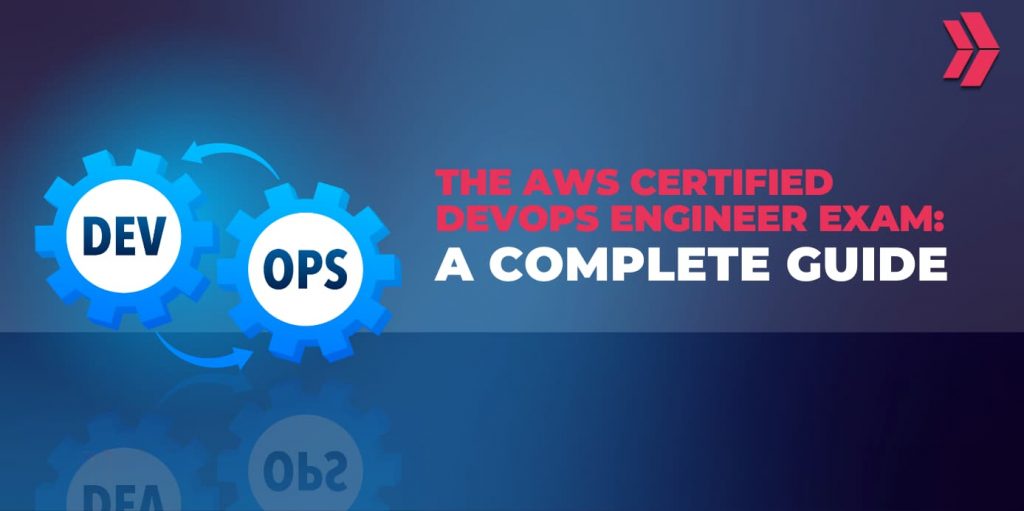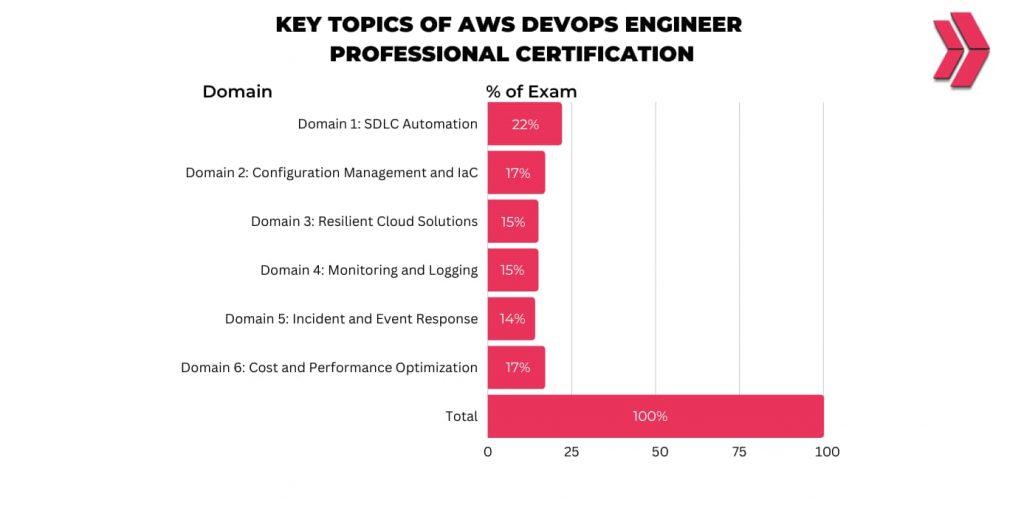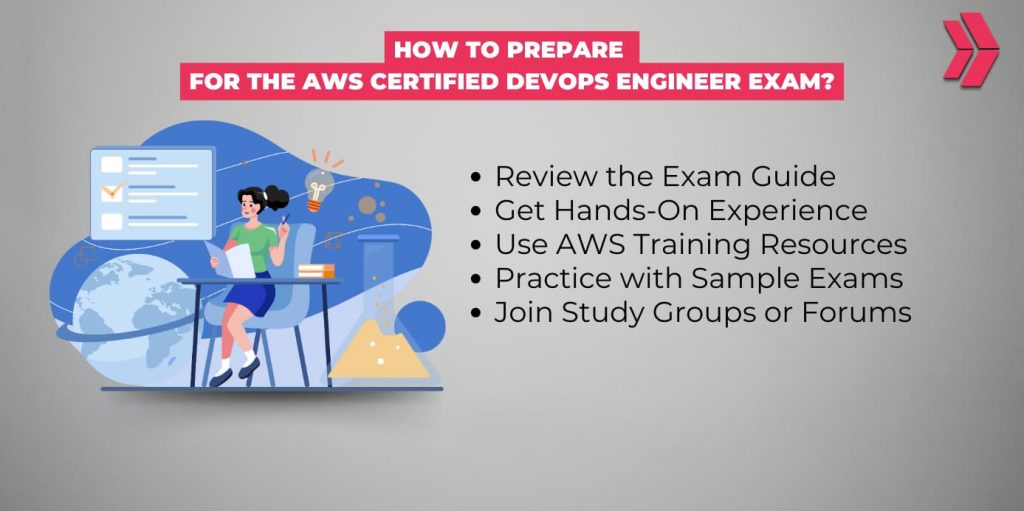The AWS Certified DevOps Engineer – Professional certification proves your expertise in automating, deploying, and managing applications on Amazon Web Services (AWS). This certification validates your ability to apply DevOps practices to enhance cloud operations through automation, continuous delivery, and operational excellence.
If you’re looking to learn how to elevate your cloud computing skills and take the next step in your tech career, the AWS Certified DevOps Engineer – Professional certification is an excellent choice. In this guide, you’ll understand the core skills and knowledge areas tested in the exam, and discover how to prepare effectively. Whether you’re just beginning your AWS certification path or looking to specialize in DevOps, this certification opens the door to new career opportunities.

Who Should Take the AWS Certified DevOps Engineer Exam?
The certification is ideal for professionals who already have experience with AWS and wish to specialize in DevOps practices. It’s particularly suited for:
- Developers who aim to integrate DevOps practices into their development workflows.
- System administrators managing AWS environments.
- Operations engineers looking to improve deployment automation and system efficiency.
To be eligible for the exam, candidates should have at least two years of hands-on experience working with AWS services and DevOps practices.
What Does the AWS Certified DevOps Engineer Exam Cover?
The exam tests your knowledge in six key domains, each focused on crucial DevOps tasks and the use of AWS tools to perform these tasks effectively. Below is an overview of each domain:
1. SDLC Automation (22%)
This domain is focused on automating the Software Development Life Cycle (SDLC). You’ll need to demonstrate your skills in:
- Setting up CI/CD pipelines to automate the build, test, and deployment processes.
- Automating code deployments and release workflows.
- Integrating AWS services to streamline application delivery.
Key Tools: AWS CodePipeline, AWS CodeBuild, AWS CodeDeploy.
2. Configuration Management and Infrastructure as Code (IaC) (17%)
In this area, the focus is on using Infrastructure as Code (IaC) to automate infrastructure provisioning and configuration management. Key tasks include:
- Managing infrastructure with code to ensure consistent, repeatable deployments.
- Automating the provisioning and configuration of AWS resources using IaC tools.
- Maintaining version-controlled infrastructure definitions.
Key Tools: AWS CloudFormation, AWS OpsWorks.
3. Resilient Cloud Solutions (15%)
This domain focuses on designing resilient, scalable, and highly available solutions using AWS services. To excel in this area, you need to demonstrate your ability to:
- Develop fault-tolerant and load-balancing strategies to ensure high availability.
- Use AWS Auto Scaling to enable applications to adapt automatically to changes in workload.
- Create backup, disaster recovery, and business continuity plans for minimizing downtime.
- Design and manage architectures for regionally and geographically distributed systems.
Key Tools: Amazon EC2 Auto Scaling, Elastic Load Balancing (ELB), Amazon Route 53, AWS Backup.
4. Monitoring and Logging (15%)
Monitoring and logging are essential for maintaining system health and identifying issues. In this domain, you’ll need to demonstrate your ability to:
- Set up monitoring tools to track application and infrastructure performance.
- Implement logging systems to capture and analyze data from your AWS resources.
- Troubleshoot performance issues by analyzing logs and metrics.
Key Tools: Amazon CloudWatch, AWS X-Ray.
5. Incident and Event Response (14%)
This domain focuses on creating efficient response plans and automating incident detection and remediation. Key skills include:
- Designing response plans for handling incidents and service disruptions.
- Automating incident detection and implementing mitigation strategies.
- Ensuring quick and effective recovery from incidents through automated responses.
Key Tools: AWS Systems Manager, AWS Lambda.
6. Security and Compliance (17%)
Security is a fundamental component of DevOps and cloud operations. In this domain, you’ll be tested on:
- Implementing security best practices for cloud infrastructure, including identity and access management (IAM) policies.
- Using encryption methods to protect sensitive data both at rest and in transit.
- Ensuring compliance with regulatory standards and frameworks.
Key Tools: AWS Identity and Access Management (IAM), AWS KMS (Key Management Service), AWS Config.

Exam Details:
- Certification Level: Professional
- Exam Duration: 180 minutes
- Format: 75 questions (multiple choice/multiple response)
- Cost: $300 (Check AWS for updated rates)
- Testing Options: In-person at Pearson VUE or online proctored
- Languages: English, Japanese, Korean, Simplified Chinese
AWS keeps the exam focused on practical skills, making hands-on experience essential for success.
What Skills Are Needed for AWS Certified DevOps Engineer Certification?
To pass the AWS Certified DevOps Engineer – Professional exam, you need a combination of technical knowledge and hands-on experience with AWS services. Here’s what you should focus on to succeed:
AWS Core Services
- Compute Services:
- Amazon EC2 (Elastic Compute Cloud): Used for scalable computing power.
- AWS Lambda: A serverless computing service that lets you run code without provisioning or managing servers.
- Storage Services:
- Amazon S3 (Simple Storage Service): Used for storing and retrieving any amount of data, anytime.
- Amazon EBS (Elastic Block Store): Provides block-level storage for use with EC2 instances.
- Networking Services:
- Amazon VPC (Virtual Private Cloud): Allows you to create your own private network in AWS.
- Amazon Route 53: A scalable DNS and domain management service for routing traffic.
Familiarity with these core services is essential for building and managing infrastructure on AWS.
DevOps Tools
- CI/CD (Continuous Integration/Continuous Delivery):
- AWS CodePipeline: Automates your build, test, and deploy phases for faster, more reliable application delivery.
- Jenkins: An open-source automation server for building, testing, and deploying applications.
- Configuration Management:
- Ansible: An automation tool that helps with configuration management and application deployment.
- Chef: Automates infrastructure management and provisioning, ensuring consistency across environments.
These tools help automate and streamline workflows, which is a key principle of DevOps.
Automation Skills
- Scripting Languages:
- Python, Bash, or PowerShell: These languages are used to write scripts that automate repetitive tasks like deployments, scaling, and resource management.
- Automating Deployments and Scaling:
- AWS Elastic Beanstalk: A PaaS (Platform as a Service) that simplifies application deployment and management.
- AWS Lambda and AWS CloudFormation: Tools that allow you to automate infrastructure provisioning and scale applications as needed.
Automation is critical to DevOps. These tools and skills allow you to efficiently deploy and scale applications without manual intervention.
Problem-Solving Abilities
- Troubleshooting Deployment Issues:
As a DevOps engineer, you must be able to identify and fix issues quickly to ensure continuous uptime. - Resolving Scaling and Performance Challenges:
You will need to solve performance bottlenecks and scale your applications to handle increased demand.
By mastering these skills, you’ll be well-equipped to tackle the AWS Certified DevOps Engineer exam. With a strong grasp of AWS tools and DevOps practices, you can efficiently deploy, manage, and scale applications on AWS—making you a valuable asset to any cloud team.
How to Prepare for the AWS Certified DevOps Engineer Exam?
To successfully pass the AWS Certified DevOps Engineer – Professional exam, follow these preparation steps:
- Review the Exam Guide: Familiarize yourself with the exam guide on the AWS website, which outlines the domains and the associated skills.
- Get Hands-On Experience: Spend time working with AWS services, particularly those mentioned in the exam guide. Practical experience is key to understanding how to implement DevOps practices in the AWS environment.
- Use AWS Training Resources: AWS offers training courses, whitepapers, and labs that focus on the specific skills needed for the exam.
- Practice with Sample Exams: Take practice exams to familiarize yourself with the exam format and types of questions you’ll encounter.
- Join Study Groups or Forums: Participate in online forums, study groups, or AWS meetups to exchange knowledge and learn from others’ experiences.

You can download AWS DevOps Engineer Professional Certification example questions prepared by Clarusway instructors here.
What Are the Benefits of This Certification?
Here are the benefits of AWS Certified DevOps Engineer Certification:
- Career Advancement: Certification can lead to roles like DevOps Engineer, Cloud Engineer, or Systems Architect.
- Higher Earnings: Certified professionals often earn higher salaries compared to non-certified peers.
- Recognition: Employers value AWS certifications as proof of expertise.
- Skill Validation: Certification confirms your ability to implement DevOps best practices using AWS tools.
Conclusion
The AWS Certified DevOps Engineer – Professional exam is a challenging but rewarding certification for professionals who want to prove their ability to manage, deploy, and automate applications on AWS using DevOps principles. By focusing on the six key domains—SDLC automation, IaC, monitoring and logging, incident response, high availability, and security—you’ll be well on your way to achieving this prestigious certification.
With the right preparation and hands-on experience, passing the AWS Certified DevOps Engineer exam can open doors to advanced career opportunities and enhance your credibility as an AWS and DevOps professional. To ensure success, consider enrolling in AWS training that offers practical, real-world scenarios to help you gain the skills needed for the exam.
Frequently Asked Questions (FAQs)
1. How does AWS Certified DevOps Engineer – Professional Certification differ from other AWS certifications?
AWS Certified DevOps Engineer – Professional Certification focuses on automating, deploying, and managing applications on the AWS cloud using DevOps practices, emphasizing CI/CD, infrastructure as code, and monitoring. Other AWS certifications, such as Solutions Architect or Developer, focus more on broader concepts like cloud architecture or application development.
Learn more about AWS certification paths: What is AWS Certification?
2. Is AWS Certified DevOps Engineer – Professional Certification suitable for beginners in cloud computing?
No, this certification is intended for professionals with at least two years of hands-on AWS experience and foundational knowledge of DevOps principles. Beginners should start with entry-level certifications like AWS Certified Cloud Practitioner or AWS Certified Solutions Architect – Associate.
Get started with AWS certifications: AWS Certification Path: Which Certificate Is Right For You?
3. What is the time commitment required to prepare for AWS Certified DevOps Engineer – Professional Certification?
Preparation time varies based on your existing knowledge of AWS and DevOps. On average, candidates spend 2-3 months of part-time study. It’s important to combine theoretical learning with hands-on practice using AWS tools like CodePipeline, Lambda, and CloudFormation.
Learn preparation strategies for AWS exams: Prepare for AWS Certification Exam
4. How does AWS Certified DevOps Engineer – Professional Certification enhance my resume?
AWS Certified DevOps Engineer – Professional Certification shows employers you possess advanced skills in areas like automation, scalability, and system monitoring, which are critical for cloud infrastructure management. This certification sets you apart in the competitive job market, especially for roles in DevOps and cloud engineering.
5. Can AWS Certified DevOps Engineer – Professional Certification help me transition into a DevOps career?
Yes! AWS Certified DevOps Engineer – Professional Certification provides you with practical, in-demand skills needed for a DevOps engineer role, making it ideal for those looking to transition from other IT fields like system administration, networking, or software development.
Explore career transitions with AWS certifications: Top 11 Benefits of AWS Certification
6. Are there online or in-person options for taking the AWS Certified DevOps Engineer – Professional Certification exam?
Yes, the exam is available at Pearson VUE testing centers for in-person testing or online through AWS-proctored exams, offering flexibility for remote learners who prefer to take the exam from home.
Check exam details and scheduling: Book and Schedule AWS Certification Exam Guide
7. What is the long-term value of AWS Certified DevOps Engineer – Professional Certification?
AWS Certified DevOps Engineer – Professional Certification provides not only immediate career benefits but also long-term value by keeping your skills relevant in a rapidly evolving tech landscape. As AWS continues to grow, certified professionals are in high demand for cloud and DevOps roles across industries.
Read about how AWS Certification future-proofs your career: What Jobs Are Available With AWS Certification?
8. How do I choose the right training provider for AWS DevOps Certification?
Look for providers that offer comprehensive resources, hands-on labs, and live instructor support. Clarusway provides tailored AWS courses to fit different learning styles and career goals.
Get advice on selecting the best training: How to Choose an AWS Course




